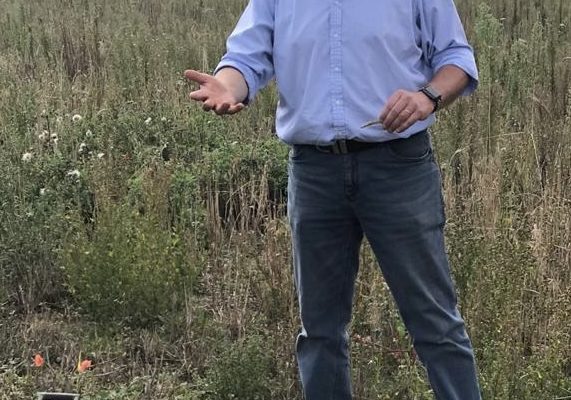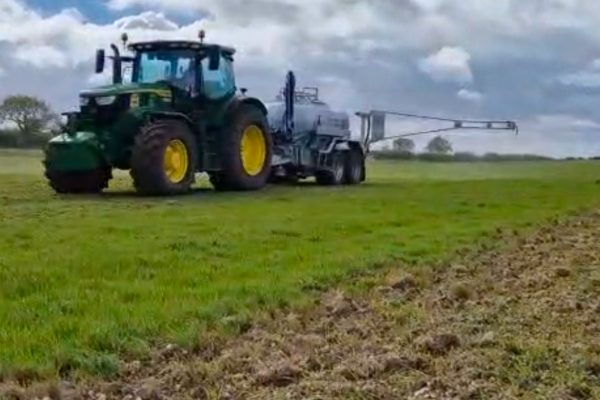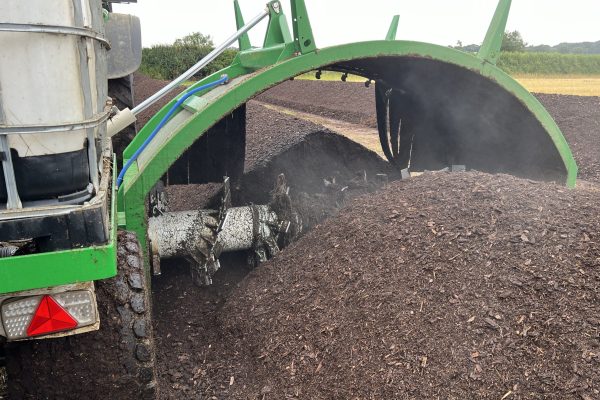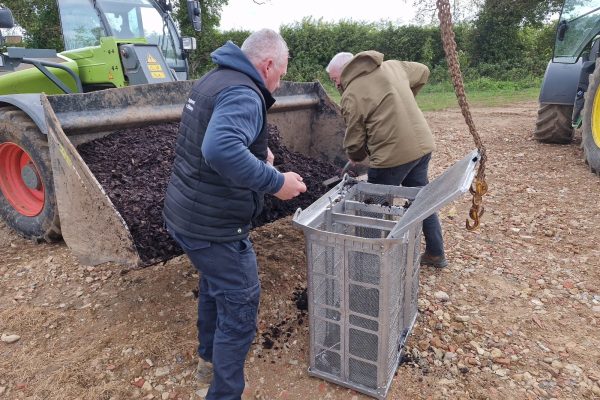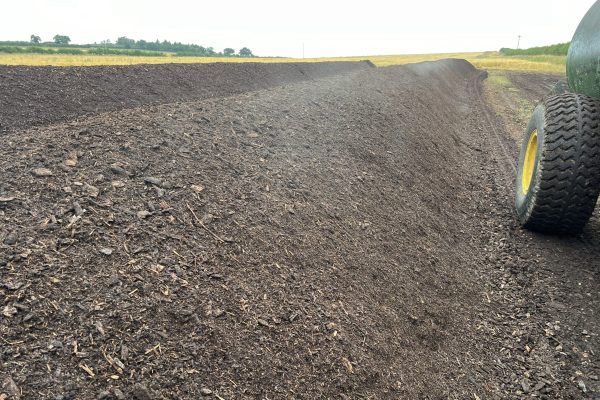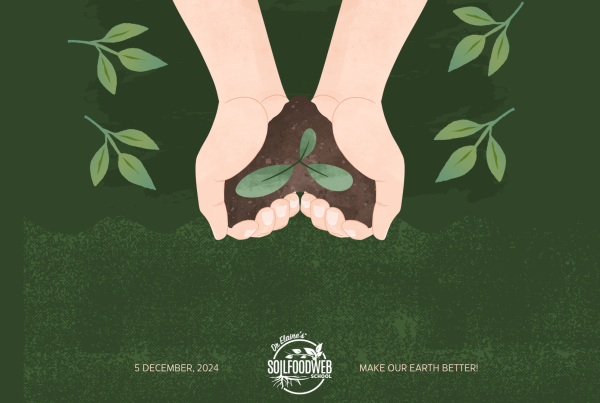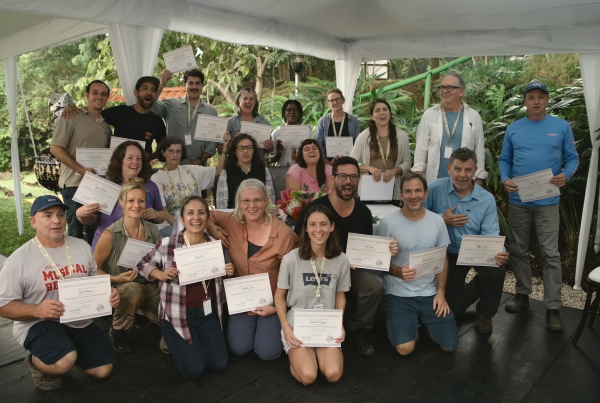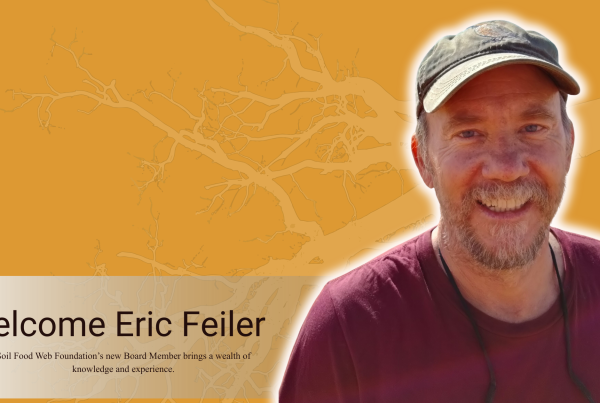Grateful Greetings
As 2024 comes to its close, we at the Soil Food Web School are looking back on a year of growth, exciting new workshop experiences that allowed us to actually meet some of you in person and yes, a few failed compost piles, from which we learned valuable lessons.
This year brought us a thrilling milestone as we celebrated the certification of our 50th Soil Food Web Consultant! In a few months time, we then passed 60 and, at the time of publishing, we are currently at 62. A huge congratulations to all of our Advanced Program students who have worked so diligently to complete their final projects in the Consultant Training Program! Their mentors are beaming with pride in their accomplishments and our entire team wishes them the best as they continue implementing the Soil Food Web Approach through their own consultancies, serving clients worldwide.
In addition to our Consultant Training Program graduates, we have also had an impressive 107 new soil lab-technicians complete the Certified Lab-Tech Program this year! If you’re in need of biological soil testing services, please check our website to see which of our graduates are nearest you.
Workshops were on our agenda this past year and we’re gearing up for several more in 2025. We collaborated with Ecosystem Restoration Camps on a workshop in Mexico in February. In July, we headed to Costa Rica where our Consultant Training Program and Grower Training Program students were invited to participate in a hands-on composting workshop to advance their skills in creating biologically complete compost. We’ve incorporated your feedback about where you’d like to attend future workshops into our plans for next year. Share your thoughts on desired locations here. Be sure to check your email for announcements of upcoming workshop opportunities and click here to hear more from Dr. Elaine and her faculty on what you can expect at these immersive experiences.
Soil Food Web School Blog
Check out our latest blog post from Dr. Carla Portugal. She shares insights on World Soil Day, which was December 5, and offers engaging ways to celebrate and support soil health initiatives.
Staff Spotlight: Nick Padwick
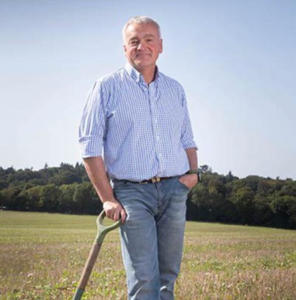 We are very pleased to introduce you to Nick Padwick, who has over 40 years of experience in large-scale agriculture across various countries! Nick is known for producing substantial compost volumes (with over 1.5 miles in windrows currently) and developing specialized equipment for compost extract application. He is a Soil Food Web Consultant and also a mentor in our Consultant Training Program, where he shares his decades of expertise with students eager to soak up his knowledge.
We are very pleased to introduce you to Nick Padwick, who has over 40 years of experience in large-scale agriculture across various countries! Nick is known for producing substantial compost volumes (with over 1.5 miles in windrows currently) and developing specialized equipment for compost extract application. He is a Soil Food Web Consultant and also a mentor in our Consultant Training Program, where he shares his decades of expertise with students eager to soak up his knowledge.
In a recent webinar, Nick shared his experiences in scaling regenerative farming practices, focusing on the challenges and successes of transitioning large farms to the Soil Food Web Approach. Catch the replay where he discussed both the challenges and successes of implementing these eco-friendly and economically viable methods.
Can you tell us a little bit more about your background and how it brought you to the soil food web?
My soil food web journey started about five years ago. Before that, I was a farmer’s son from Hampshire from the south of England and all I’ve ever wanted to do from my earliest memory was farm. After finishing school, I had some fantastic opportunities to work on some large farms here in the south of England and later manage some farming businesses.
My wife and I developed a program called From Farm to Fork. We really wanted to get the kids out of the city and let them know where food comes from. The program ran for 10 years and we had 110,000 children come through it. We cooked with them and talked about nature and wildlife– all the things that my dad taught me on the farm.
Why did you decide to join the Soil Food Web School as a student?
Over the course of my career, I have seen a lot of really BAD things in agriculture, which I really just struggle with like insecticides we used to use, pollution and losing biodiversity. As I got older, I felt less comfortable with it. I had the opportunity with Kent Hill, the property where I work now, to say to them that we need to try something new and just reset. I saw a video from Dr. Elaine and realized she had a school. I’ve not been taught any of this when I was at college. I took the Foundation Courses around holding down my full time job and just absolutely loved it. I really do think that anyone going into any type of agriculture or anything having to do with growing or horticulture, anything to do with soil, everyone should do the Soil Food Web School Foundation Courses as a minimum. It should be a rite of passage! I got straight on to the CLP with my amazing mentor, Melanie Harris.
I did my CTP alongside starting up my own business, Wild Soils, and I kind of learned the value of me.
It’s honestly a dream come true. I think of myself when I first started this and it’s been such an incredible journey. It really HAS changed my life! My son is now doing the Foundation Courses. He’s starting the CLP soon and he’s coming to join me at my business. We support, guide and mentor farmers on their regenerative farming journeys. We also create compost as part of the business and I have about a mile and a half of windrows now.
What is your favorite part of working with students who are studying soil science?
I am super super excited to be involved. It’s just so fulfilling!
It’s an absolute privilege to be working with so many amazing people within this school. I learned so much more from the students, which enriches the experience for other students.
”Since I started as a student at the Soil Food Web School, I saw the mentors really take on board people’s style of learning. Now that I’m a mentor, I really want to help teach people in the way that they want to learn.
Which microbe is your favorite and why?
I love a testate amoeba. I find them fascinating. I love the shape. I love that on some species you can see the scales through a 400X microscope. I still get excited when I’m doing assessments and spot them.
What are your favorite activities outside soil work?
Making compost and trialing different recipes is something that I thoroughly enjoy doing. I love to see the changes in materials and how that might affect the level of microbiology we have in our finished compost.
Student Spotlight
This past year, a generous student of the Foundation Courses chose to make a huge difference in the lives of some of their fellow students by funding several scholarships so Foundation Course graduates who were otherwise unable to afford the Consultant Training Program could take that course.
The grateful recipients are embarking upon the next stage of their training at the Soil Food Web School as they enter the Consultant Training Program under the guidance of the skilled mentors we have on staff, among whom are PhD biologists and consultants with years of experience, like Nick Padwick. If you would like to learn more about the Consultant Training Program, please click here or contact our Student Support Team anytime at ss@soilfoodweb.com.
Advanced Program Student Achievements
In 2024,we are proud to say 107 new Soil Food Web Lab-Techs have completed the Certified Lab-Tech Program! While some took the program to hone their skills for application on their own projects, the majority of them are aiming to develop their new businesses or expand their previous offerings to include the biological testing of soil and compost samples. When you’re in the market for this type of testing, please check our website for the folks nearest you.
This year, 28 students have completed their Consultant Training Program and Grower Training Program certifications. If you are in need of a qualified Soil Food Web Consultant, look no further than here on our website, where you can find the contact information for all of our consultants.
Alex Yakaumo
Anton de Jager
Declan Ramsay
Kent Holle
Kevin Chee
Leslie Lewis
Nick Padwick
Robbin Pott
Vera Dorzhinova
Dora Taklec
Stefan Nieuwenhuijsen
Nathalie Sequeira
Arved Meinzer
Joshua Stone
Mario Villamiel
Wes Sanders
Niels de Jong
Wendy Mickle
Kyle Babcock
Jeroen Boss
Nicolas Rondeau
Reinhard Leeb
Jana Paskova
Julian Ravenscroft
Mary Beerman
Dorota Romanowski
Bianca Lech
Richard Oosthuysen
Staff Anniversaries
In the last quarter, we have celebrated several staff anniversaries! We take pride in our diverse staff of passionate people united by the vital mission of helping others to save the world’s soils.
We’re happy to congratulate the following staff members on their recent anniversaries with the Soil Food Web School:

Allison Duck, Student Services and Content Producer
5 years
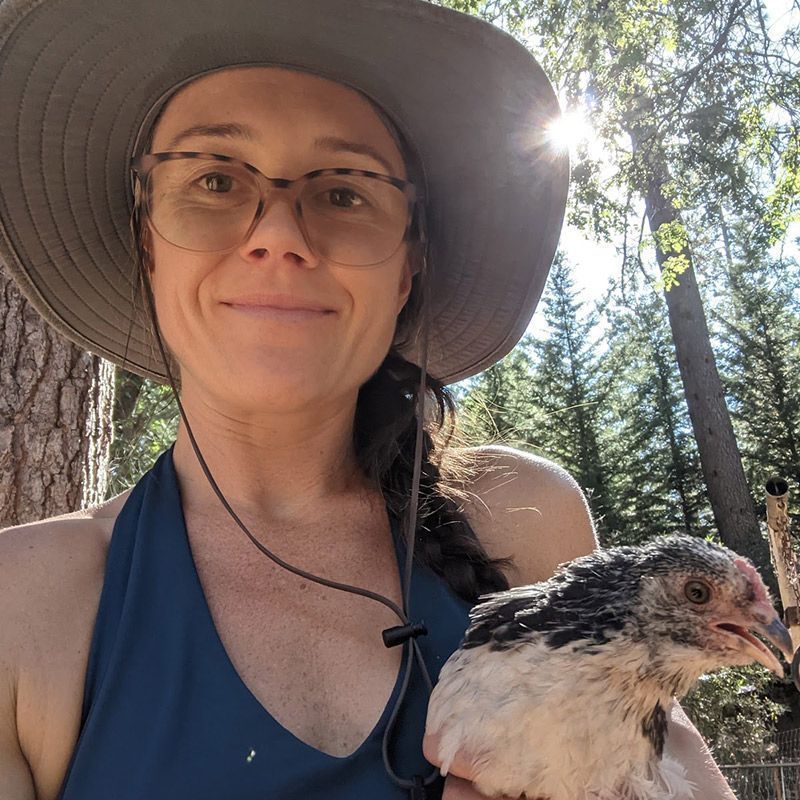
Samantha Bass, Marketing Associate
5 years
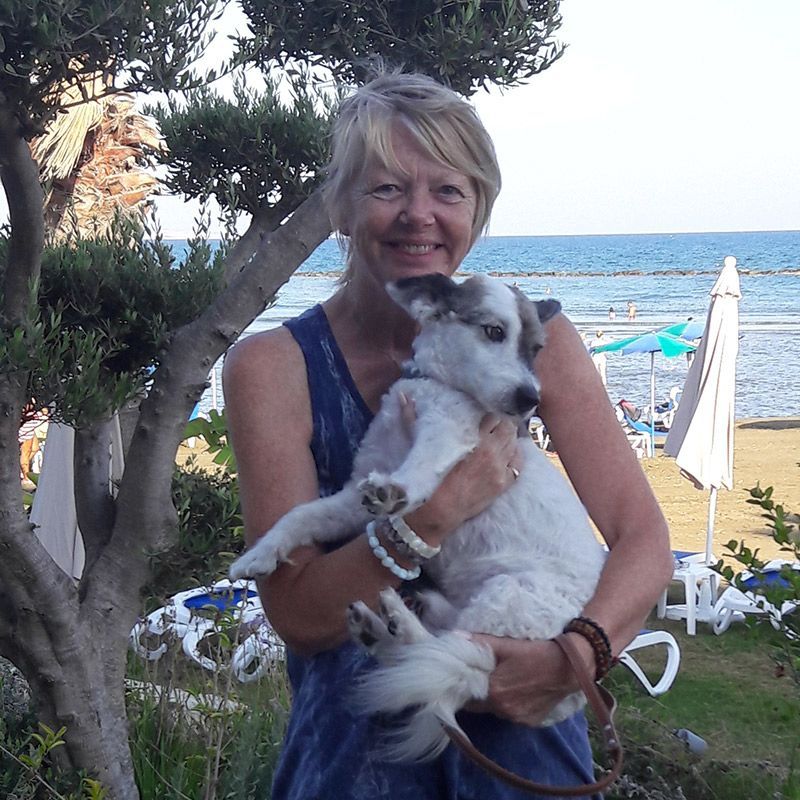
Trish Wilkinson, Student Services
3 years

Caterina Capri, Advanced Programs Instructor
1 year

Nora Levay, Advanced Programs Mentor
1 year
Regen Ag in the News
- Farmers and growers are experiencing the challenges of the increasing expense of chemical fertilizers, not to mention the harmful ecological effects our planet undergoes from their use. Last year, a group of researchers, led by Assistant Professor Ariel Furst, at MIT developed a promising solution to better help achieve sustainability. Read more about how these MIT engineers have designed bacteria with a special coating that could facilitate the use of microbes as sustainable fertilizers in this article on EcoInventos’ website.
- Climatologists from Colorado University (CU) Boulder and the University of Gothenburg have used computer simulations to try and help predict when the Arctic Ocean might experience its first ice-free day. The projections range from the next couple of years to the end of the decade but the majority of simulations predicted that this worrisome milestone would arrive within 7 to 20 years. Read more about what these researchers are predicting in this Science Alert article.
- This article from Reuters outlines how the rural communities in the Andes of Colombia and Ecuador are battling to protect wetlands that are vital to their water cycles. El Niño has brought challenging weather patterns causing drought while local environmental advocates seek ways to save water and restore native plants in these countries.
Answers to Your Frequently Asked Questions
We get asked a few questions rather often so we want to share the answers here so all can benefit.
The Soil Food Web School Mentoring Team weighs in on time and temperature in compost piles.
Q: My compost pile was hot and isn’t anymore. Is it still viable??
A: The answer depends on how long it was hot for and how hot it got, as well as on your turning technique.
We emphasize the need to check the organism community in the finished pile, to make sure it has adequate abundance and diversity of bacteria, fungi, protozoa, and nematodes – to ensure its effectiveness in restoring the soil biome. It often takes time for this community to assemble and thrive.
Another important consideration and “goal” of thermophilic composting, is to kill pathogenic organisms, thus ensuring that they don’t end up in the soil and on the food being grown. Once the temperature inside a compost pile reaches 131 F (55 C), this process of killing/harming microbes that may cause disease is initiated. Per USDA regulations, we emphasize that all the materials in the pile need to be “hot enough for long enough,” to filter out potential pathogens, so we teach students to turn the pile in such a way that all parts spend adequate time in the “hot center”. An additional benefit to doing this, is that weed seeds are also neutralized.
It sounds like you may only be heating around 40-60% of the material in your pile. Instead of using heat to thoroughly filter out the undesirable organisms in a relatively short time, the emerging “beneficial” community of organisms competes with, consumes, and inhibits the potentially “harmful” organisms (primarily a biological filter instead of a heat filter). That takes time, particularly if not all materials were heated up to knock down the populations of potential pathogens. So you may have to wait several months to achieve the same effect.
Join us on Social Media!
Stay connected with the Soil Food Web School by following us on social media! Connect with us on Facebook, Instagram and LinkedIn. If you’re a student with us, you can now add Soil Food Web School to your list of education entries on LinkedIn. Here is a guide on how to do that.

